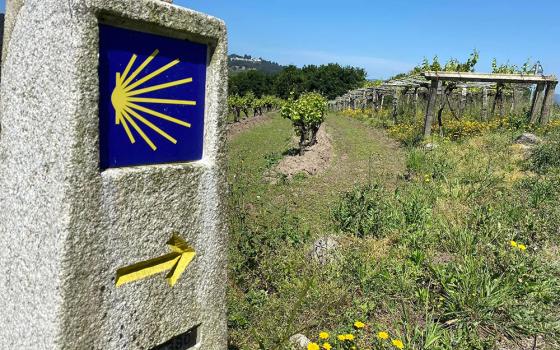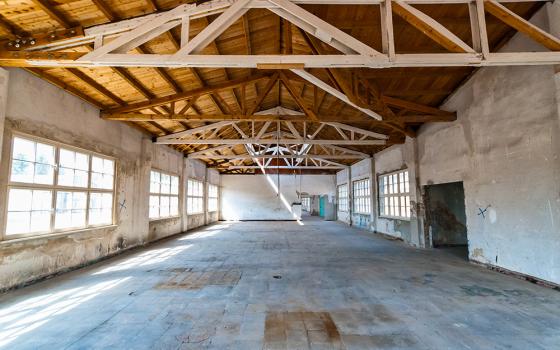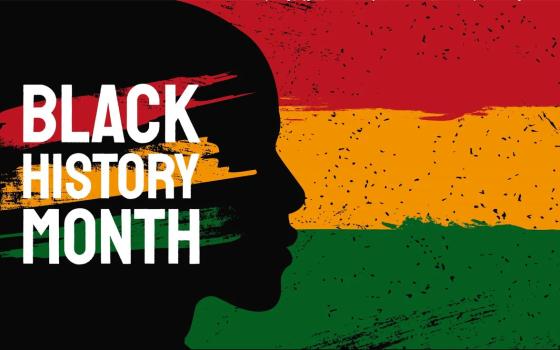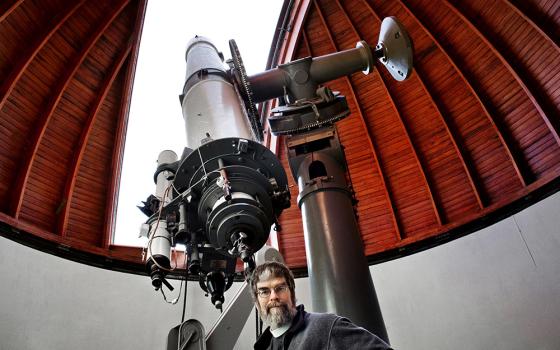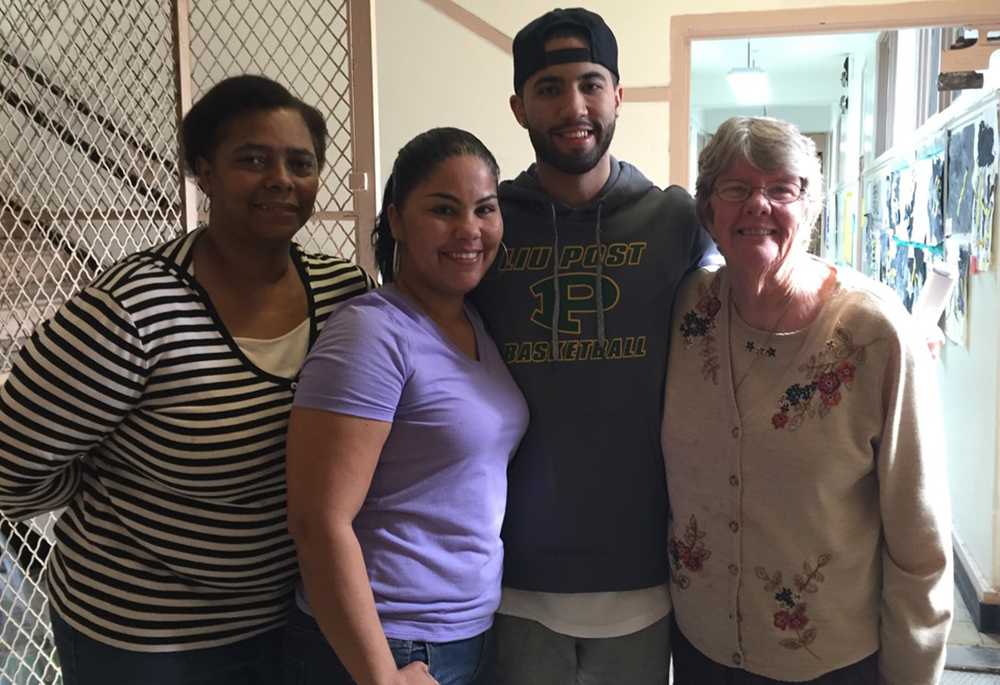
Sr. Maggie McDermott, a member of the Sisters of St. Dominic of Blauvelt, New York, recently retired from a 43-year-ministry at the Tolentine Zeiser Community Life Center in the New York City borough of the Bronx, where she served as founder and executive director. Here she is seen, far right, with Tolentine staff members. (Courtesy of the Sisters of St. Dominic of Blauvelt, New York)
Sr. Maggie McDermott, a member of the Sisters of St. Dominic of Blauvelt, New York, recently retired from a 43-year-ministry at the Tolentine Zeiser Community Life Center in the New York City borough of the Bronx, where she served as founder and executive director.
The center's work and ministry focus is directly connected to the congregation's charism of "serving the poor and marginalized."
"I have dedicated my life to helping people in need," McDermott said, noting that she has family ties in the Bronx, having grown up in the borough and attending grammar school and high school there.
One of the ministries McDermott is particularly proud of is Susan's Place, a shelter for homeless women with mental illness that she helped establish in 1996. The center serves 200 women facing mental health challenges, addiction and homelessness.
Before her retirement, McDermott told a congregational communications staff person that the idea for such a shelter stemmed from her work with Susan Neighbacker, an advocate for those experiencing homelessness. Neighbacker died before the center's opening — hence the honor of naming the center after her.
"I felt that this population was overlooked," McDermott said. "Providing the right staff and encouraging atmosphere made this special place perfectly aligned with the mission of the Sisters of St. Dominic of Blauvelt."
GSR: Tolentine Zeiser Community Life Center's homeless ministry has been important but so has your work in providing day care for children.
McDermott: I knew many people in the neighborhood when I first went there. Initially, we provided day care because I felt this was the greatest need in that community, so women could work and go to school. Mothers and caregivers had a safe place to put their children. In the beginning, we had about 180 children, but with the pandemic and increasing street violence in the Bronx, we had only 106 this year.
The pandemic had an impact because many parents would not let their children out with other children. Also, because of increased street violence, many parents will not allow their children to come to pre-K, which is unfortunate because it is such a good learning experience for them.
It's been proven that kids who are in these preschool programs really do better in life ultimately.
Yes. I believe they do better in life because they learn how to get along with other children at an early age. Most of them are the only child in their family. So preschool teaches them to get along in groups and play with other children. They don't like to share when they first come, but then they get used to the idea. That's a big step.
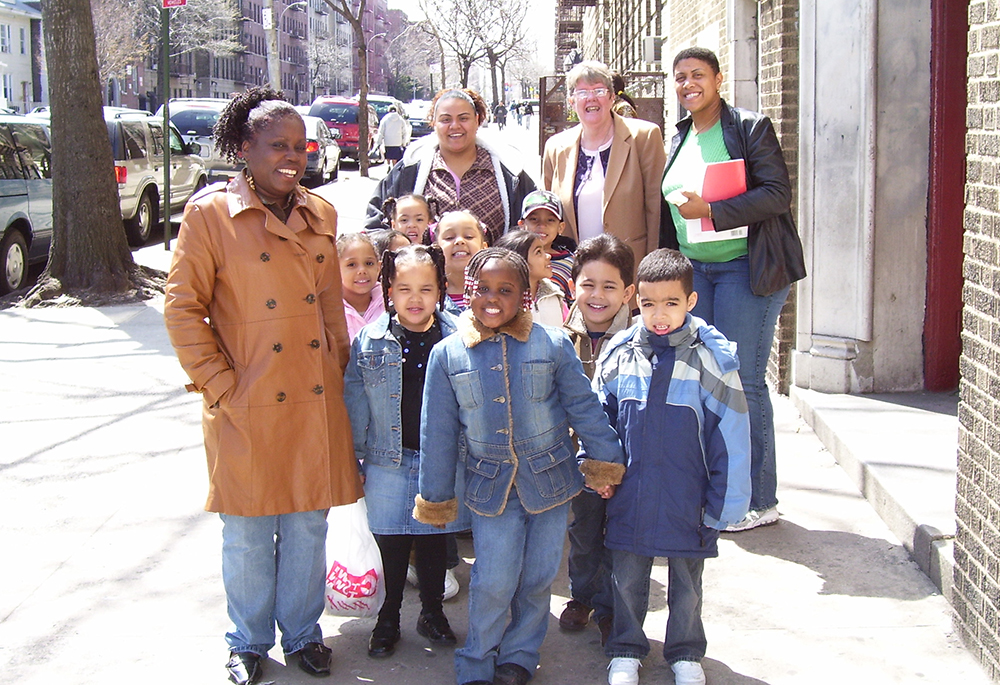
Sr. Maggie McDermott of the Sisters of St. Dominic of Blauvelt, New York recently retired from a 43-year-ministry at the Tolentine Zeiser Community Life Center in the Bronx. Here she is pictured (second from right, back row) with Miss Willie’'s pre-K class at Tolentine Universal Pre-K in the 1990s. (Courtesy of the Sisters of St. Dominic of Blauvelt, New York)
Working with children and their families is a calling. What in particular has been fulfilling about that? Because kids can be a challenge.
The children we mainly had were 3- and 4-year olds. It's hard to keep them grounded in the classroom early in the school year. We would have to lock the front door because some of them would get up and leave, and then we'd be missing them. We had to always be on our toes to keep them safe until they adjusted to the structure of the day. Many of the children had very little structure at home.
We found creative ways to keep them busy and engaged at all times. We would also talk to them about their little lives and ask how things are going. Very often, you can tell by their faces when they come in the morning everything about the night before — what happened last night at home, and so forth. Many of these young children have many problems, yet they have access to everything that life can bring.
So that is why I feel as young as they are, they can get an education because there is access to education. And somebody in their family must ensure they continue on that road. When kids are up to about the fourth or fifth grade, everything is fine. Then sixth grade comes, and these kids begin acting out in ways their parents cannot control.
Education starts in day care. "We are not a babysitting service" — that is what we used to tell the parents. "This isn't a babysitting place," we'd say. "This is a place where your children learn to get along with others and learn their letters, numbers, colors, confidence, respect, and other skills that will give them a boost when they enter school."
And what are some of the challenges that the kids in the Bronx, in that neighborhood of the Bronx, now face?
Many are from broken families, and a lot of violence. The violence is getting worse. Violence is a terrible thing. And I think the kids pick up their fear from their parents. Parents are so scared something is going to happen to their children. Because they read about it, see it on the news, and lose friends and family members. At such a young age, these children are experiencing death all around them and a lack of respect for life.
After 43 years, what are you proudest of?
I am most proud of encouraging women to attend community college and then transfer to a four-year college, giving them a chance to get better jobs and increase their income. I believe education is the only way up and out of poverty. So you've got to study, become something and make sure your children are doing the same thing. My co-worker graduated from Dominican University in New York. I am very proud of that. She attended Monroe Business School and then went on to Dominican University for her bachelor's degree.
Advertisement
What was left undone that still needs doing in the Bronx? And what are the current overall needs in the Bronx right now?
I think what is left undone is not being able to help the influx of immigrants. We cannot help them because they don't have their legal documentation. Since they don't have this paperwork, they can't apply to the agency for children's services. So that's one thing. I don't know if they will change the rules or what they will do. That is a big problem now.
The housing situation in the whole country is a real problem. In New York City, of course, it's a challenge for everyone. What is the affordable housing situation in the Bronx?
They charge so much for a one-bedroom apartment — $1,500 a month. So that's why multiple families share small spaces, each paying their share to pay the rent. But it's too much. It is not the right way for families to live. Homelessness, of course, is another challenge.
We have two homeless programs within the Tolentine Zeiser Community Life Center. One is called Siena House, which houses 29 single women with one child, two or under. The other one is called Sammon Build Center, which has 48 families with two, three and four children. For these families, it is a great help. But I think overall, the homeless situation has gotten worse. People are sleeping on the [subway] trains. They are killing people on the subway. It's not good. I don't know the answer to it. I wish I did. I think people fall on hard times, can't pay their bills, and become desperate.
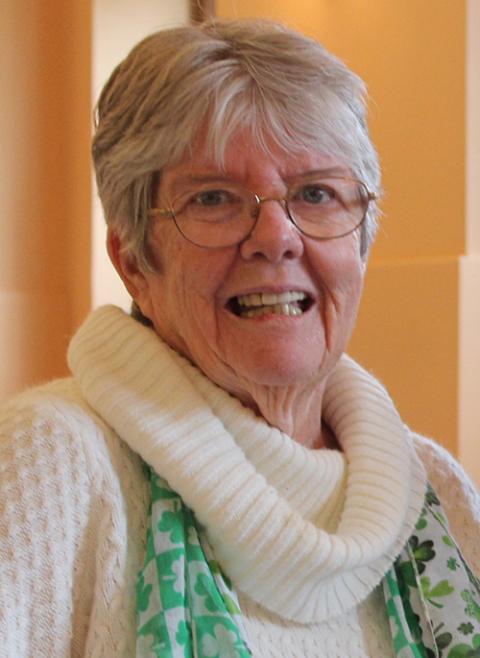
Sr. Maggie McDermott, a member of the Sisters of St. Dominic of Blauvelt, New York (Courtesy of the Sisters of St. Dominic of Blauvelt, New York)
Has anything gotten better in the Bronx in the last four decades?
The charter schools coming in are trying to raise the children's interest and love for school. They are strict and structured, kids like the schools, and they are leaving the often dangerous public school environment.
But there are also more economic pressures. Sometimes I used to stand at the door and see the neighborhood people in the morning. They get up early, make their way to the train, and go to work. The same way the people I knew back in my day made the same commitment. But people today are not making enough money to survive and just can't make ends meet anymore. Things are so expensive.
How has the congregational charism undergirded your work?
Our community was founded by Mother Mary Ann Sammon, whose primary commitment was working with orphaned children living on the streets of New York City. So I felt that this was a way to closely follow my congregation's charism and work with children and their families — parents, grandparents or other designated caregivers.
What has kept you grounded all these years? And tell me a little bit about your faith journey and how that's kept you grounded.
My faith journey has definitely kept me grounded — my trust in God, my love for God. That's why I became a sister — because I wanted to help others. I also work on my own personal life to calm it down. You have to keep it low-key, with no jumping up for every little battle that happens. So it really is always God guiding me.


